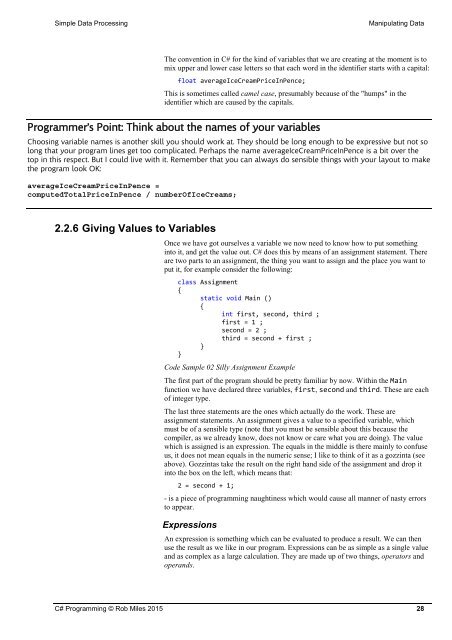C Programming Yellow Book
6019BjHWX
6019BjHWX
Create successful ePaper yourself
Turn your PDF publications into a flip-book with our unique Google optimized e-Paper software.
Simple Data Processing<br />
Manipulating Data<br />
The convention in C# for the kind of variables that we are creating at the moment is to<br />
mix upper and lower case letters so that each word in the identifier starts with a capital:<br />
float averageIceCreamPriceInPence;<br />
This is sometimes called camel case, presumably because of the "humps" in the<br />
identifier which are caused by the capitals.<br />
Programmer’s Point: Think about the names of your variables<br />
Choosing variable names is another skill you should work at. They should be long enough to be expressive but not so<br />
long that your program lines get too complicated. Perhaps the name averageIceCreamPriceInPence is a bit over the<br />
top in this respect. But I could live with it. Remember that you can always do sensible things with your layout to make<br />
the program look OK:<br />
averageIceCreamPriceInPence =<br />
computedTotalPriceInPence / numberOfIceCreams;<br />
2.2.6 Giving Values to Variables<br />
Once we have got ourselves a variable we now need to know how to put something<br />
into it, and get the value out. C# does this by means of an assignment statement. There<br />
are two parts to an assignment, the thing you want to assign and the place you want to<br />
put it, for example consider the following:<br />
class Assignment<br />
{<br />
static void Main ()<br />
{<br />
int first, second, third ;<br />
first = 1 ;<br />
second = 2 ;<br />
third = second + first ;<br />
}<br />
}<br />
Code Sample 02 Silly Assignment Example<br />
The first part of the program should be pretty familiar by now. Within the Main<br />
function we have declared three variables, first, second and third. These are each<br />
of integer type.<br />
The last three statements are the ones which actually do the work. These are<br />
assignment statements. An assignment gives a value to a specified variable, which<br />
must be of a sensible type (note that you must be sensible about this because the<br />
compiler, as we already know, does not know or care what you are doing). The value<br />
which is assigned is an expression. The equals in the middle is there mainly to confuse<br />
us, it does not mean equals in the numeric sense; I like to think of it as a gozzinta (see<br />
above). Gozzintas take the result on the right hand side of the assignment and drop it<br />
into the box on the left, which means that:<br />
2 = second + 1;<br />
- is a piece of programming naughtiness which would cause all manner of nasty errors<br />
to appear.<br />
Expressions<br />
An expression is something which can be evaluated to produce a result. We can then<br />
use the result as we like in our program. Expressions can be as simple as a single value<br />
and as complex as a large calculation. They are made up of two things, operators and<br />
operands.<br />
C# <strong>Programming</strong> © Rob Miles 2015 28


